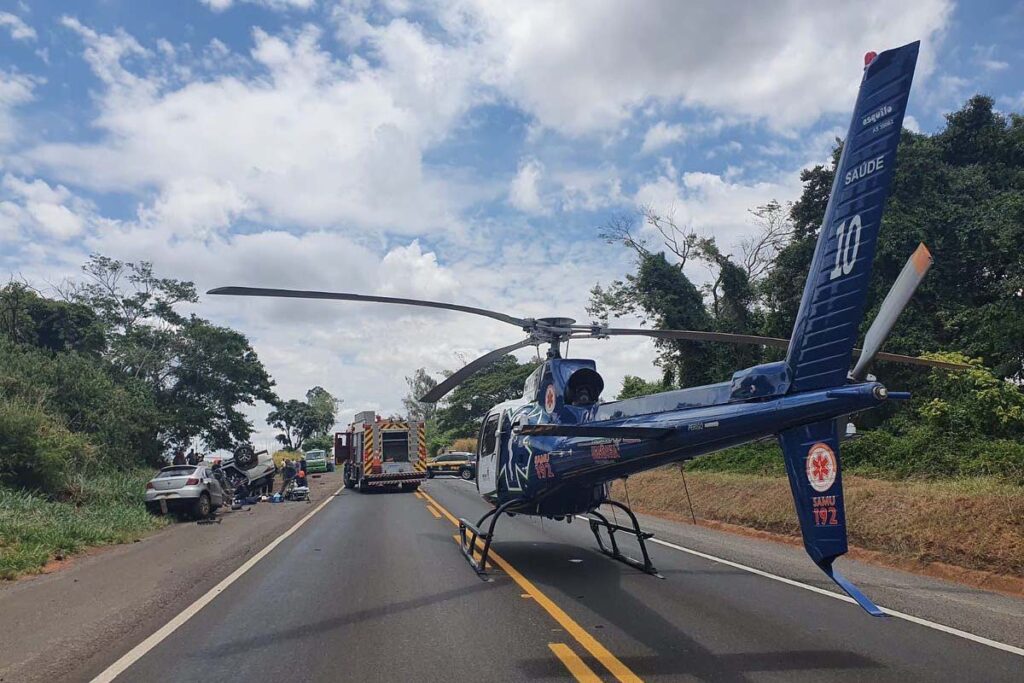The first blood transfusion in the aeromedical history of Brazil took place in Maringá, in western Paraná, on October 17th. It was carried out with the support of a helicopter from Helisul Aviação, which has been in the market for 50 years and is responsible for providing the aeromedical rescue service to the government of the state of Paraná.
At the time, a team from the Mobile Emergency Care Service (SAMU) inaugurated the technology with the to a 47-year-old man. The patient was the victim of a crash between a motorcycle and a truck and was seriously injured. He suffered severe chest and abdominal bleeding.
Help arrived quickly and the man received type O Negative (universal) blood transfusion already inside the aircraft, even before being sent to a hospital in the region, as reported by physician Maurício Lemos, from SAMU Regional de Maringá.
“Immediately, the helicopter team arrived, already recognized this type of hemorrhagic shock and installed the blood component ( the two bags of blood)”, says the professional.
According to Lemos, the aim of this pioneering project is to provide what is best for the patient, in this case , blood, associated with a quick arrival at the hospital and, subsequently, surgical treatment. “It keeps our eyes open and looking for technologies to provide more possibilities and more hope for our critically ill trauma patients.”
Higher chance of survival
The aeromedical service, which has operational support and Helisul helicopters, is activated in Maringá for three types of occurrences: rescues on highways, traffic accidents of all kinds (on state, federal or rural roads) and aeromedical removals, which mean patients who are in places that do not have conditions for definitive treatment, as in the case of a myocardial infarction , who needs catheterization; stroke, which needs thrombolysis; aneurysm, which needs surgery; among other situations, explains the doctor.
Until then, patients who presented exsanguinating hemorrhage (severe external), that is, due to abdominal trauma or amputations, received a transfusion of saline solution or rigerlactate (crystalloid solutions), to prevent dehydration or renal failure of the patient until arrival at a hospital, to then receive blood by transfusion.
With this innovation, the patient already receives blood even before hospital care, increasing the chances of survival of the victim of trauma, explains Lemos.
“When we used only saline solution, we were trying to replace volume with crystalloids, which are solutions that maintain, temporarily, the patient’s perfusion, a reasonable blood pressure level. But it is a product that does not replace blood, it does not carry oxygen, because blood carries red blood cells that carry oxygen. Too much whey is also harmful. The benefit of blood is to exchange for what the human being really needs.”
The operation was initially implemented in Maringá. The idea, however, is to look for indicators in the first six months, to then take the technology to other bases in the state of Paraná, which can serve as an example for the whole country. Before the use of blood transfusion in the aeromedical service, the technology existed only in ambulances in Bragança Paulista (SP) and in the state of Santa Catarina.
Transportation of bags and maintenance
The blood bags are transported by Helisul helicopters inside a special imported box. It is able to keep blood at an ideal temperature, strictly monitored by a control system via app and GPS.
To ensure the best performance of the aircraft, so that bags and medical teams arrive as quickly as possible and that all transport takes place safely for crew and passengers, Helisul invests in the most modern technology.
The helicopter operator actively participates in the project, both in the acquisition of equipment and renovation of the structure, as well as in the availability of aircraft, hangar and service maintenance and commemorates yet another pioneering action.
“It is very gratifying to be part of this important milestone in the aeromedical service of Paraná, which has the noble mission of give greater survival to patients, victims of serious accidents, especially in cases of hemorrhage”, highlights the operational superintendent of Helisul, Bruno Biesuz.


